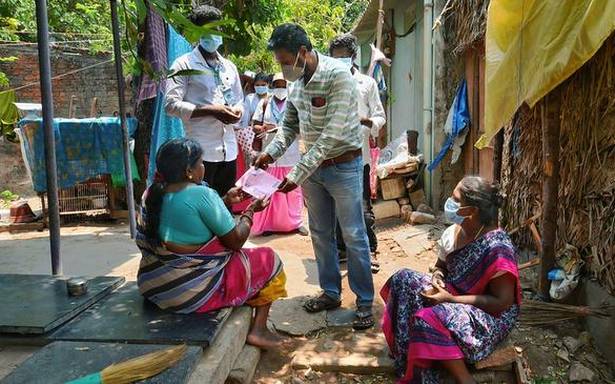Exemptions granted to lower the impact on economy, say officials
Amid a rising graph of second wave coronavirus cases, the administration on Thursday framed orders on prohibited and permissible activities that would be in force during the complete lockdown starting 10 p.m. on Friday and the partial restrictions from Monday up to April 30.
In a bid to cushion the impact on economic activities, the State Emergency Operations Centre (SEOC) permitted a range of activities during the weekend lockdown, such as shops dealing with food, groceries, fruits and vegetables, dairy and milk booths, meat and fish, industrial production, animal fodder, pharmaceuticals, opticians, medicines and medical equipment, and newspaper distribution.
The high-level meeting with officials, chaired by Lt. Governor Tamilisai Soundararajan, on Tuesday had gone through the pros and cons before arriving at a decision to go in for a complete lockdown on the weekend and restricted timings next week, officials said. In essence, the measures, while allowing calibrated access to markets, simultaneously seek to discourage shopping as a family outing or random socialising behaviour for a brief period of time.
According to officials, the administration had to weigh the deleterious effect of a complete lockdown on an already struggling local economy against the need for drastic action to disrupt the highly transmissible second wave of COVID-19. The administration’s hand was apparently forced by a combination of the steep increase in the caseload and the attendant pressure it put on health manpower and infrastructure and the feedback on lax compliance with safety norms, mainly with regard to social distancing on the streets.
The Police Department’s inputs pointed to a ground situation where even though masking had become the default norm for the majority of the population venturing out, the distancing and sanitising aspects of COVID-19 appropriate behaviour left much to be desired.
The non-compliance with safety protocols at social gatherings, apart from high-footfall places, such as markets, shops and recreation spots including the beach, was cause for concern, officials said.
Striking a balance
“We have attempted to strike a balance between curtailing common liberties and sustaining the local economy,” Chief Secretary Ashwani Kumar said.
“While our health infrastructure is more than adequate to deal with the existing situation, we needed to inject a sense of urgency in the public about the seriousness of the second wave,” he said.
In recent weeks, there has been a net increase in COVID-19 cases, where new admissions have far outstripped recoveries, leaving the Union Territory at levels worse off than the peak of 2020. Left unchecked, a rising graph has the potential to quickly exhaust health infrastructure even at its ramped up state of preparedness, he pointed out.
“The measures are designed to discourage people from coming out of their homes without a valid reason and to restrict outdoor visits to those purely functional. We have been noticing that people keep coming out of their homes in the evenings and remaining on the streets longer than they need to…and this is high-risk behaviour during the second wave of the pandemic,” said T. Arun, Health Secretary.
According to the SOEC guidelines, on top of the night curfew in place from 10 p.m. till 5 a.m., there will be a complete lockdown in force through Saturday and Sunday till 5 a.m. on Monday. The guidelines also state that from Monday till April 30, shops/business/commercial establishments will be open only up to 2 p.m. on weekdays.
Restaurants/food courts/tea shops will operate with up to 50% occupancy level. A range of essential services have been exempted from the total lockdown on the weekend as well.
‘Prioritise visits’
“We hope that by keeping essential outlets functioning during the total lockdown and with restricted timings from Monday, the panic-buying associated with lockdowns is avoided even while getting people to prioritise their outdoor visits,” the Chief Secretary said.
Marriage functions would be allowed with a cap of 100 people, and funeral/last rites with a maximum of 50. This will be allowed even during the weekend lockdown. Religious congregations/gatherings and temple festivals are prohibited. Religious places shall remain open for regular poojas with strict COVID-19 appropriate behaviour, the guidelines said.
Among other activities to be exempted are industrial production units, home delivery of food, hospitals, medical labs, shops, ambulance and hearse vehicles, medical and allied services and all emergency cases. So are goods transport and public passenger transport (buses/autos/taxis), vehicles carrying agricultural produce, agriculture and allied activities.
Point of load bunks, banks, insurance offices, ATMs and SEBI/stock related offices, telecom, media, IT, cold storages, warehousing, private security agencies, water supply, sanitation, electricity and law and order, emergency, fire, municipal and election-related activities are also outside the purview of the restrictions.
Persons engaged in government essential services will be permitted to function on production of valid ID and passengers allowed to transit on providing valid tickets.
Source: Read Full Article

